Celebrity parents have a way of surprising us — especially when it comes to their baby name ideas.
Outside of February, April is consistently one of the least popular months to have a child, per the CDC.
But for those of you who are lucky enough to welcome a newborn on or around the Easter holiday, let this act as a reminder of all the incredibly adorable Easter names you could give your baby boy or girl.
Starting with April, of course.
RELATED: 150+ Baby Names With Weird Meanings
Despite its gradual decline over the past few decades, April has been a top-600 girls name in the United States every year since 1941, according to the U.S. Social Security Administration (SSA).
It was even in the top-100 every year between 1967 and 1991, per the SSA.
Pascal — as in physicist Blaize Pascal, actor Pedro Pascal and NBA player Pascal Siakam — is a more unique choice that has only appeared in the SSA’s top 1,000 once (in 1910) over the past 125 years.
It comes from the Latin name Pascha, meaning “Easter,” and Hebrew word pesah, meaning “Passover.”
Today, we’re seeing a new generation of Easter names emerge in the baby-naming universe — and it includes everything from spring names to flower names and names inspired by bunny rabbits.
Here are some of the most unique Easter names worth considering for your baby name list!
Easter Names Related to Renewal and New Beginnings

As a springtime celebration, Easter arrives when nature awakens from winter dormancy — characterized by trees budding with fresh leaves, flowers emerging from the soil and days growing longer and warmer.
This natural renewal provides a perfect backdrop for the holiday's deeper spiritual meaning.
In Christianity, Easter commemorates the resurrection of Jesus Christ — the ultimate rebirth story. After his crucifixion and death, Jesus' return to life symbolizes victory over death and eternal life for believers.
Anyone having a child on or around Easter can use this meaning as inspiration for their baby’s name. Here are some of our best ideas for Easter baby names.
Anastasia

Origin: Greek
Meaning: Resurrection; Up-standing
Anastasia, pronounced an-uh-STAY-zhuh, derives from the Greek word anastasis, which is composed of the Greek elements ana, meaning “up,” and stasis, meaning “standing.” It’s translated as “resurrection.”
Chava

Origin: Hebrew
Meaning: Full of life; Breathing; Living
Chava, pronounced HAH-vah or KHAH-vah depending on dialect, is the Hebrew form of Eve. It derives from the Hebrew word hawa, meaning "to breathe," or haya, meaning "living." In the Hebrew Bible, Eve (Chava) was the first woman.
Renee

Origin: French; Latin
Meaning: Born again; Reborn
Renee, pronounced ruh-NAY, is the feminine form of René, which is the French form of the Latin name Renatus, meaning "born again" or "reborn." In French, it’s often spelled with an accent (René or Renée).
Chaim

Origin: Hebrew
Meaning: Life
Chaim, pronounced KHYE-im (with a guttural "ch"), comes from the Hebrew word chayim, meaning "life." It's traditionally a masculine name common in Jewish communities and is connected to the popular Jewish toast "L'chaim!" meaning “To life!”
Tadessa
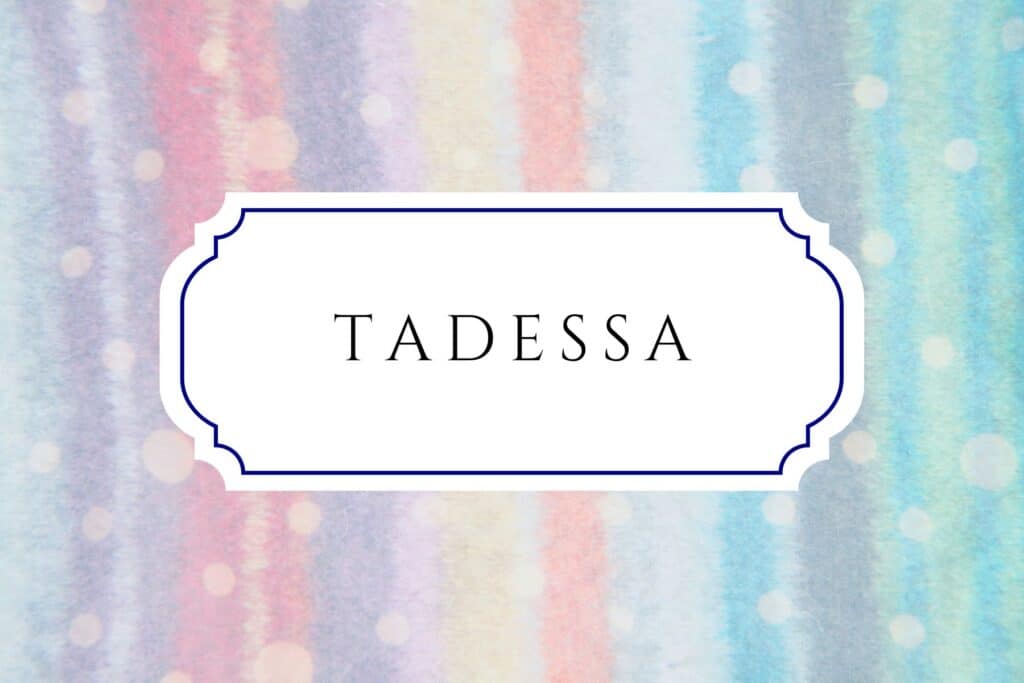
Origin: Amharic
Meaning: Revived; Resurrected
Tadessa, pronounced tah-DESS-uh, is the feminine form of the Amharic name Tadesse, which is derived from the Amharic word for “revived.” The name relates to concepts of renewal and resurrection.
Tadesse

Origin: Amharic
Meaning: Revived; Resurrected
Tadesse, pronounced tah-DESS-ay, translates to “revived” in Amharic, the official language of Ethiopia. It's traditionally a masculine name, but it can double as a unisex name that sounds a bit like Tess.
Aurora

Origin: Roman; Latin
Meaning: Dawn; Morning
Aurora, pronounced uh-ROR-uh, comes from the Latin word for "dawn." In Roman mythology, Aurora was the goddess of the morning who flew across the sky announcing the arrival of the sun each morning.
Renato

Origin: Italian; Latin
Meaning: Born again; Reborn
Renato, pronounced reh-NAH-toh, is the Italian masculine form of the Latin name Renatus, meaning "born again" or "reborn." It’s also a popular name among Portuguese- and Spanish-speaking families.
Renata

Origin: Italian; Latin
Meaning: Born again; Reborn
Renata, pronounced reh-NAH-tah, is the feminine form of Renato, which is derived from the Latin word renatus, meaning "born again” or “reborn.” The name has religious connotations of spiritual renewal.
Phoenix

Origin: Greek
Meaning: Rise from the ashes; Dark red; Mythical bird
Phoenix, pronounced FEE-niks, derives from the Greek word phoinix, originally meaning "dark red" or "crimson." It became associated with the mythical bird that regenerates by rising from its own ashes.
Genesis

Origin: Greek
Meaning: Origin; Beginning
Genesis, pronounced JEN-uh-sis, comes from the Greek word genesis, meaning "origin" or "beginning." It gained recognition as the first book of the Bible, which describes the creation and beginning of the world.
Janus

Origin: Roman; Latin
Meaning: God of beginnings
Janus, pronounced JAY-nuhs, comes from Roman mythology where Janus was the god of beginnings, transitions, arches and gateways. He was typically depicted with two faces looking in opposite directions.
Zoe

Origin: Greek
Meaning: Life
Zoe, pronounced ZOH-ee, derives from the Greek word zoe meaning "life." In early Christianity, it represented spiritual life and was often adopted by Hellenized Jews as a translation of Eve.
Eva

Origin: Hebrew
Meaning: Breathing; Living; Full of life
Eva, pronounced EE-vuh or AY-vuh depending on language, is a form of Eve, derived from the Hebrew words hawa and haya, meaning "to breathe" or "living." It’s often used in Slavic and Nordic languages.
Pascal

Origin: Latin; Hebrew
Meaning: Relating to Easter; Born during Passover
Pascal, pronounced pas-KAL or PASS-kul depending on language, comes from the Latin name Paschalis, meaning "relating to Easter" or "born during Passover." It’s derived from the Hebrew word pesaḥ, meaning “Passover.”
Spring Names Inspired By the Season of Hope

There’s no better way to celebrate the beginning of Spring than with a holiday like Easter right behind it.
Astronomically speaking, the first day of spring is marked by the spring equinox — also known as the vernal equinox — which falls on March 19, 20 or 21 each year and generally lasts three months.
In 2025, the spring season began on March 20 and will end with the summer solstice on June 20.
Spring names connect your child to themes of new beginnings, natural beauty, optimism, promise and the vibrant energy that characterizes this time of year — making it perfect for a baby born during this season.
Here are some of our freshest ideas!
Chloe

Origin: Greek
Meaning: Green shoot; Blooming
Chloe, pronounced KLOH-ee, comes from the Greek word khloe meaning "young green shoot" or "blooming." In Greek mythology, it was an epithet of Demeter, the goddess of the harvest and agriculture.
Aviv

Origin: Hebrew
Meaning: Spring; Renewal
Aviv, pronounced ah-VEEV, comes directly from the Hebrew word for "spring" or "renewal." In the Bible calendar, Abib/Aviv refers to the first month of the year, which typically aligns with March-April in the modern Gregorian calendar.
Aviva

Origin: Hebrew
Meaning: Spring; Renewal
Aviva, pronounced ah-VEE-vah, is the feminine form of Aviv, derived from the Hebrew word for "spring" or "renewal." The name embodies freshness and vitality, with connections to seasonal rebirth.
Maia

Origin: Greek; Roman
Meaning: Good mother; Goddess of spring
Maia, pronounced MY-uh or MAY-uh, has roots in Greek mythology where she was the eldest of the Pleiades and mother of Hermes. The name may derive from the Greek word maia meaning "good mother." In Roman mythology, Maia was associated with spring and growth
Vesna

Origin: Slavic
Meaning: Spring; Goddess of spring
Vesna, pronounced VES-nah, comes from Slavic mythology where Vesna was the goddess of spring, the rebirth of nature and youth. The name is directly derived from the Slavic word vesna, meaning "spring."
Avril

Origin: French; Latin
Meaning: April; Spring
Avril, pronounced av-REEL (French) or AV-ril (English), comes directly from the French word for "April," which ultimately derives from the Latin word aperire, meaning "to open," referring to the opening of buds and flowers in spring.
Vera

Origin: Italian; Slavic; Latin
Meaning: Springtime; Season of spring
Vera, pronounced VEER-uh, has dual origins. In Slavic languages, it means "faith," derived from the Old Slavic věra. In Latin contexts, it's related to verus meaning "true" or "truthful." In this case, it comes from the Italian word primavera, meaning “springtime.”
Persephone
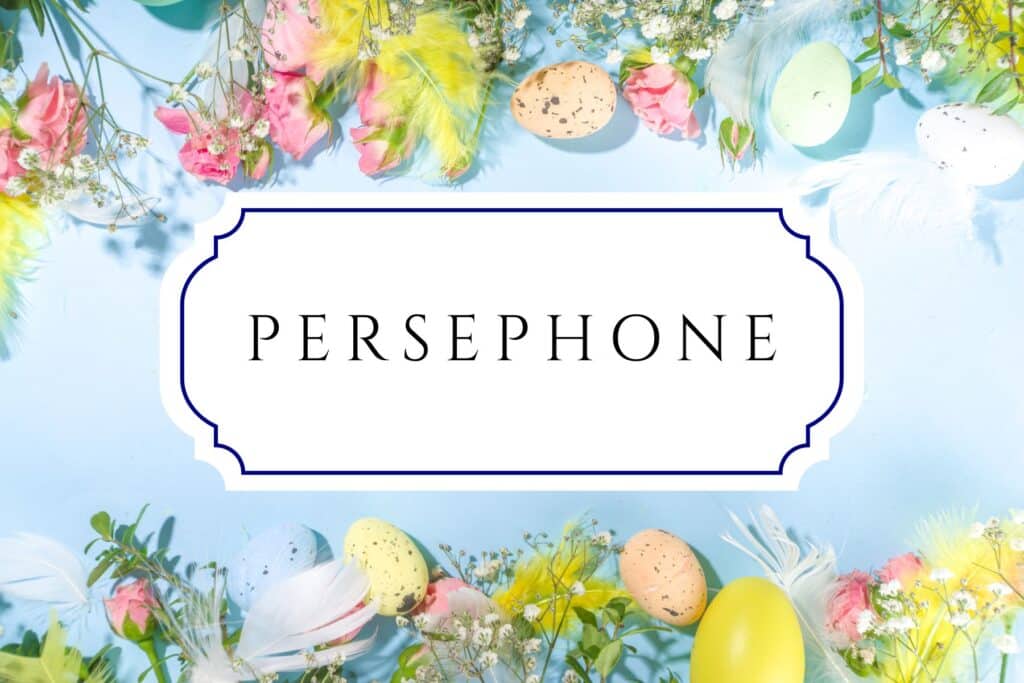
Origin: Greek
Meaning: Goddess of spring growth
Persephone, pronounced per-SEF-uh-nee, comes from Greek mythology where she was the daughter of Zeus and Demeter, and queen of the underworld. She was also the goddess of spring growth alongside Demeter.
Ostara

Origin: German
Meaning: Goddess of spring; Goddess of dawn
Ostara, pronounced oh-STAR-uh, derives from the Germanic goddess Ēostre, who is associated with spring and dawn. The name is related to the Old English ēastre, which gave its name to Easter in English.
Cerelia
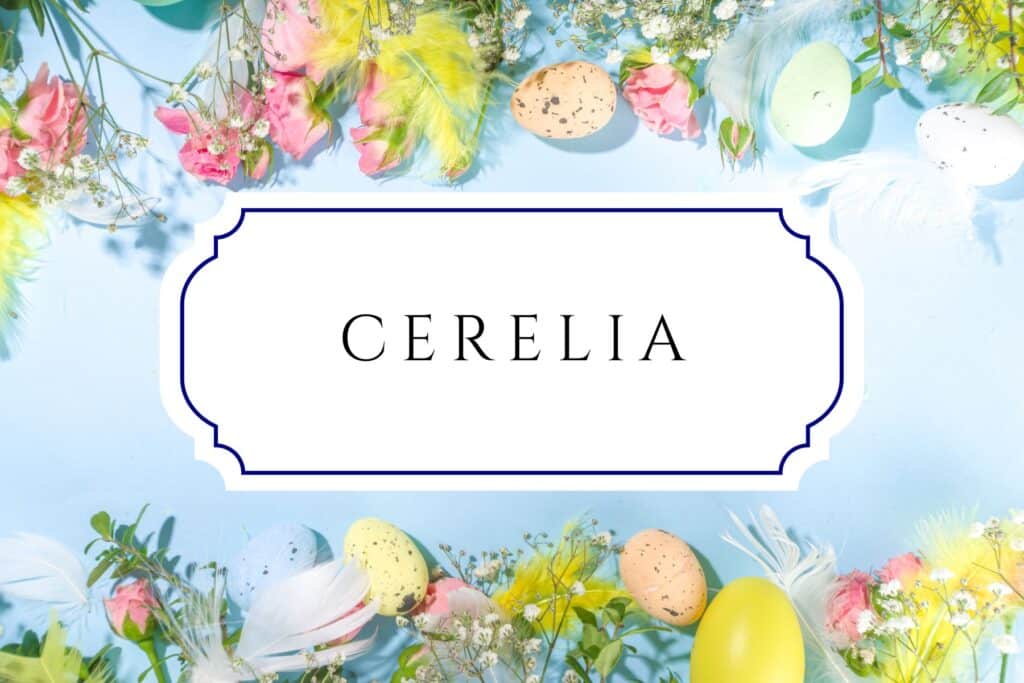
Origin: Roman; Latin
Meaning: Goddess of agriculture and harvest
Cerelia, pronounced suh-REE-lee-uh, is derived from the Latin name Cerealis, meaning “relating to spring” or “relating to Ceres,” the Roman goddess of agriculture and grain crops who was the Roman equivalent of Demeter.
Flower Names That Are Budding With Potential

Flower names will never not be trendy with expecting parents.
From Heather, the 49th most popular girl’s name over the past 100 years, to Violet and Lily, both of which ranked inside the SSA’s top-20 girl’s names in 2023 — there’s so much to love about flower names.
And since the spring season brings with it plenty of flowers, why not use it as inspiration for Easter names!
For example, other popular flower names today include Chloe, which means “green shoot” in Greek, Leilani, which means “heavenly flower” in Hawaiian, and Iris, referring to the colorful flower.
You can also go with an unconventional flower name like Blossom, Flora, Petal, Bud or Buddy.
Here are some other flower names we think you’ll like!
Linnea

Origin: Latin; Swedish
Meaning: Twinflower
Linnea, pronounced lin-NAY-uh or LIN-ee-uh, is derived from the Latin scientific name of the twinflower (Linnaea borealis), which was named after the famous Swedish botanist Carl Linnaeus.
Iris

Origin: Greek
Meaning: Rainbow; Colorful flower
Iris, pronounced EYE-ris, comes from Greek mythology where Iris was the goddess of the rainbow and messenger of the gods. The name shares its origin with the colorful flower, which was named after the goddess due to its many colors.
Dahlia

Origin: Latin; Swedish
Meaning: Dahl’s flower
Dahlia, pronounced DAL-yuh or DAHL-ee-uh, takes its name from the dahlia flower, which was named in honor of 18th-century Swedish botanist Anders Dahl. Dahlias are octoploids, meaning they have eight sets of chromosomes (where humans only have two).
Poppy
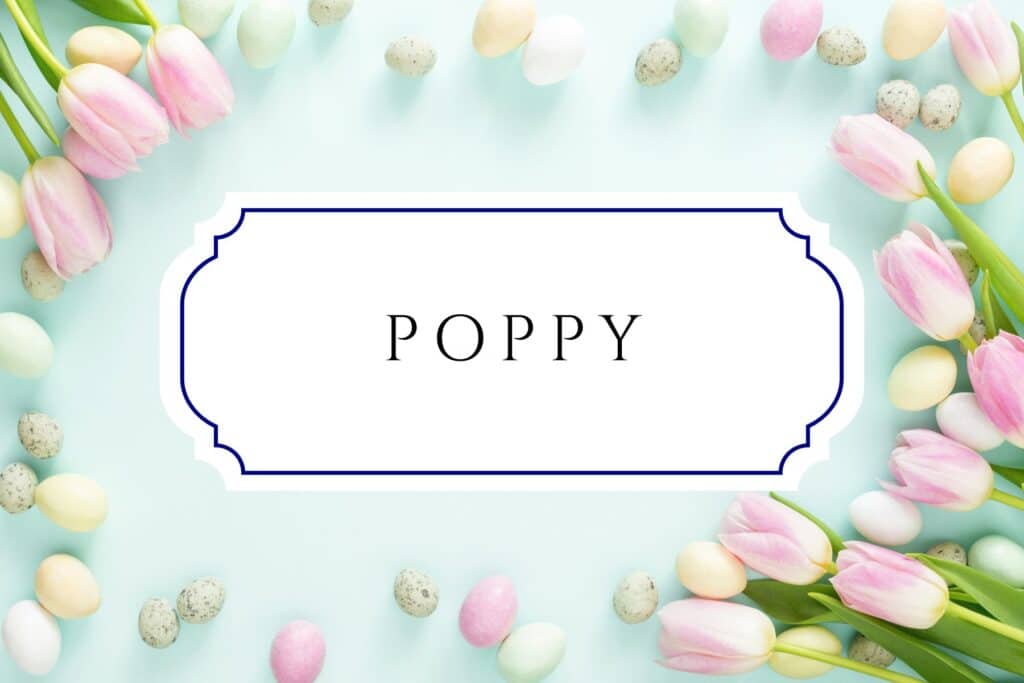
Origin: Latin; English
Meaning: Bright red flower; Remembrance
Poppy, pronounced POP-ee, comes directly from the English word for the bright red flower, which derives from the Latin word papaver. It became a symbol of remembrance after World War I and we celebrate National Poppy Day every year on the Friday before Memorial Day (one month after Easter).
Primrose

Origin: Latin
Meaning: First rose
Primrose, pronounced PRIM-rohz, comes from the Latin phrase prima rosa, which is composed of the Latin words prima, meaning “first,” and rosa, meaning “rose.” Though not an actual rose, the primrose is one of the first flowers to bloom in spring.
Magnolia
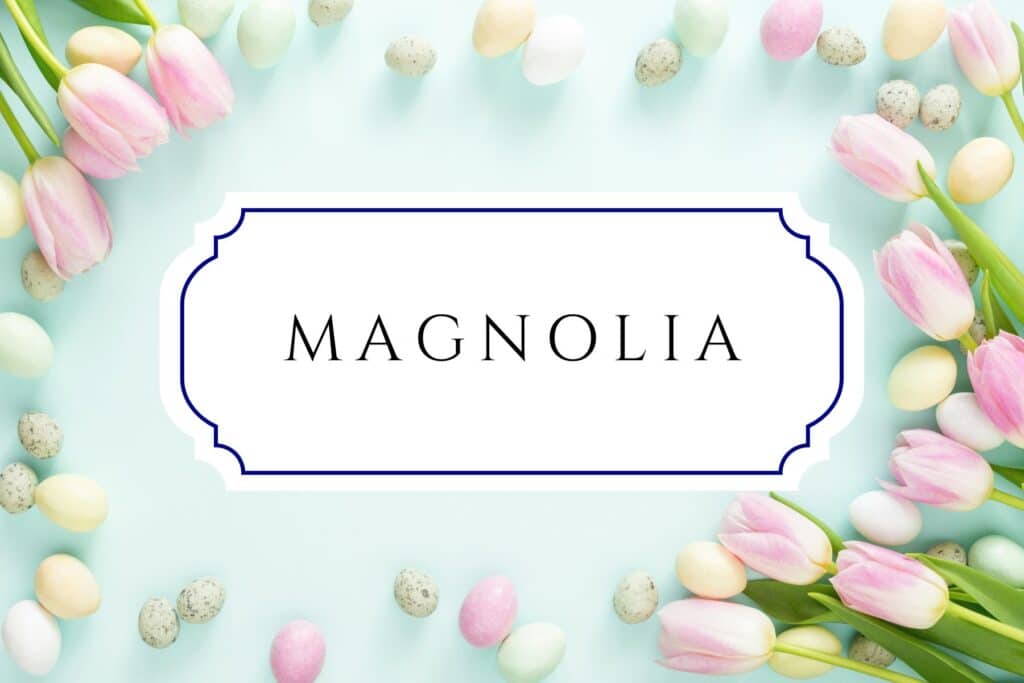
Origin: Latin; French
Meaning: Magnol’s flower; Ancient flower
Magnolia, pronounced mag-NOH-lee-uh, comes from the flowering tree named after French botanist Pierre Magnol (1638-1715). Fossils have revealed that magnolia plants existed at least 20 million years ago.
Camellia

Origin: Latin; Japanese
Meaning: Kamel’s flower; Perfection; Longevity
Camellia, pronounced kuh-MEE-lee-uh or kuh-MELL-ee-yuh, is derived from the Latinized name of Georg Josef Kamel, a 17th-century Moravian Jesuit botanist who worked in the Philippines. The Japanese use it as a symbol of perfection and longevity.
Daisy

Origin: Old English
Meaning: Day eye
Daisy, pronounced DAY-zee, comes from the Old English phrase dægeseage meaning "day's eye," referring to how the flower opens at dawn. The flower is known for its white petals and sunny center.
Zinnia

Origin: Latin; German
Meaning: Zinn’s flower
Zinnia, pronounced ZIN-ee-uh, takes its name from the colorful flower that was named after German botanist Johann Gottfried Zinn (1727-1759). They belong to the same family as asters, daisies and sunflowers.
Azalea

Origin: Greek
Meaning: Dry; Parched; Funnel-shaped flower
Azalea, pronounced uh-ZAY-lee-uh, derives from the Greek word azaleos meaning "dry" or "parched," referring to the woody nature of the plant. They’re unique for their funnel-shaped, often fragrant blossoms.
Rosalia

Origin: Latin
Meaning: Rose; Festival of the roses
Rosalia, pronounced ROH-zuh-lee-uh, is derived from the Latin word rosa, meaning “rose,” combined with the common suffix -lia. In Ancient Rome, Rosalia was an annual memorial day for one's dead relatives celebrated primarily with roses.
Forsythia

Origin: Latin; Scottish; Gaelic
Meaning: Forsyth’s flower; Peaceful flower
Forsythia, pronounced for-SITH-ee-uh, takes its name from the bright yellow spring-flowering shrub that was named after Scottish botanist William Forsyth (1737-1804). His last name translates to “man of peace” in Gaelic.
Anthea

Origin: Greek
Meaning: Flower; Blossom
Anthea, pronounced AN-thee-uh, comes from the Greek name Antheia and Greek word anthos, meaning “flower” and “blossom.” In Roman mythology, Anthea was an epithet of Hera, the Queen of the Gods.
Easter Names Inspired By Bunnies and Rabbits

This wouldn’t be a list of Easter names without a few names related to bunny rabbits.
With their soft fur, twitching noses and connection to springtime fertility, rabbits offer a charming, yet unique inspiration for Easter baby names.
For example, you can go with a baby name that directly translates to “bunny” or “rabbit,” such as Tokki — which is how you pronounce “bunny” in Korean.
You can also go with a name related to a fictional bunny, such as Roger or Peter.
These Easter names carry the lightness of spring while remaining versatile enough for a child to enjoy throughout all seasons of life. Here are some more examples!
Coelho

Origin: Portuguese
Meaning: Rabbit
Coelho, pronounced ko-EL-yo, is the Portuguese word for "rabbit." It gained literary recognition through Brazilian author Paulo Coelho, who penned The Alchemist, the world’s most translated book by a living author.
Lola

Origin: Spanish
Meaning: Sorrows
Lola, pronounced LOH-luh, is traditionally a diminutive of Dolores, which means “sorrows” via the Spanish title of the Virgin Mary, Nuestra Señora de los Dolores, meaning "Our Lady of Sorrows." In this case, it refers to Lola Bunny, who first appeared as Bugs Bunny’s love interest in the 1966 film “Space Jam.”
Peter

Origin: Greek
Meaning: Rock; Stone
Peter, pronounced PEE-ter, derives from the Greek word petros meaning "rock" or "stone." Peter Rabbit is a fictional bunny character that appears in various children's stories by English author Beatrix Potter.
Buster

Origin: English
Meaning: Clumsy; One who breaks things
Buster, pronounced BUS-ter, originated as a nickname for someone who "busts" or breaks things. Buster Bunny was the main protagonist in "Tiny Toon Adventures,” while Buster Baxter is an anthropomorphic rabbit and the best friend of Arthur Read from the TV show, “Arthur.”
Babs

Origin: Greek
Meaning: Stranger; Foreigner
Babs, pronounced BABZ, is traditionally a diminutive of Barbara, which comes from the Greek word barbaros, meaning "stranger" or "foreigner." Babs Bunny was the female counterpart to Buster Bunny in “Tiny Toon Adventures.”
Judy

Origin: Hebrew
Meaning: Woman from Judah; Jewish woman
Judy, pronounced JOO-dee, is a diminutive of Judith, derived from the Hebrew word yehudi, meaning "woman from Judah" or "Jewish woman." Judy Hopps is the main character and rabbit police officer in the animated Disney film "Zootopia.”
Leveret

Origin: Old French; Latin
Meaning: Young hare in its first year
Leveret, pronounced LEV-uh-ret, comes directly from the Old French word levrat and Latin word lepus, referring specifically to a young hare in its first year. In this sense, it’s a perfect name for a baby boy or girl born on or around Easter.
Thumper

Origin: Literary; Fictional
Meaning: Thumper; One known for thumping
Thumper, pronounced THUM-per, is a nickname that became associated with rabbits through Disney's 1942 film "Bambi," which features a rabbit character named for his habit of thumping his left hind foot.
Roger

Origin: Germanic
Meaning: Famous spear
Roger, pronounced ROJ-er, comes from the Germanic name Hrodger, which is composed of the Germanic elements hruod, meaning “fame,” and ger, meaning “spear.” Roger Rabbit is the titular character from the 1988 American fantasy comedy film "Who Framed Roger Rabbit.”
Oswald

Origin: Old English
Meaning: Powerful God; God of might
Oswald, pronounced OZ-wald, is derived from the Old English elements os, meaning “god,” and weald, meaning “powerful” or “mighty.” Oswald the Lucky Rabbit was an animated cartoon character created in 1927 by Walt Disney, prior to his creation of Mickey Mouse.
E. Aster

Origin: Fictional; Literary; Greek
Meaning: Easter; E-star
E. Aster is a clever play on "Easter," with Aster deriving from the Greek word for "star." E. Aster Bunnymund is a character from the 2012 DreamWorks animated film "Rise of the Guardians" and its accompanying book series. For a baby name, you can choose a first name that starts with E and use Aster as the middle name.
Br’er

Origin: African; American
Meaning: Brother
Br'er, pronounced BRER (like "bear" with an 'r'), is a dialectal pronunciation of "brother" in some American dialects. Br'er Rabbit is a central figure in an oral tradition passed down by African-American slaves.
Velvet

Origin: English; Latin
Meaning: Soft fabric; Plush; Fleece
Velvet, pronounced VEL-vet, comes directly from the English word for the soft, plush fabric, ultimately derived from Latin vellus meaning "fleece" or "pelt." The Velveteen Rabbit is the title character of a classic children's book written by Margery Williams, first published in 1922.
YOU MAY ALSO LIKE: 50+ Sci-Fi Girl Names Inspired By Fictional Characters
Easter names — including spring names and flower names — aren’t for everyone.
If you’re still having a hard time finding a baby name for your soon-to-be little one, head over to Mod Moms Club for more unique baby name ideas and don’t forget to try our baby name generator.
May your search for the perfect baby name end in success!












